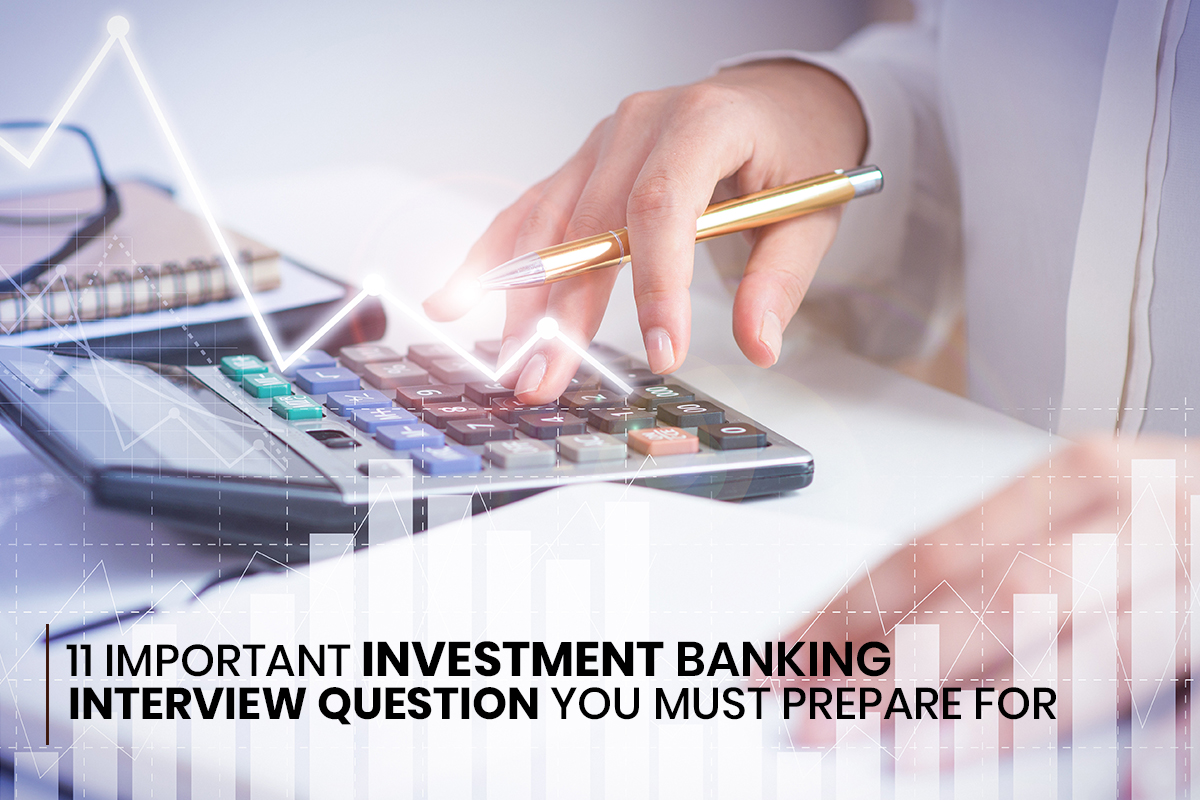Did you know that investment banking interview rank among the toughest across industries, with a success rate of less than 3%?
Landing a role in this field requires not only strong technical skills but also:
- Exceptional problem-solving abilities,
- Resilience under pressure, &
- A deep understanding of the financial world
Whether you’re a fresh graduate or someone pivoting to investment banking, knowing the questions you’re likely to encounter and how to answer them can help you stand out among a pool of candidates.
In this guide, we’ll walk you through:
- What investment banking interview questions to expect?
- What the investment banking interview process look like?
- 11 must-prepare-for investment banking interview questions for freshers
Are you prepared to confidently tackle these questions and leave a lasting impression?
What are Investment Banking Interview Questions?
Investment banking interview questions are crafted to assess your:
- Technical knowledge
- Analytical skills
- Problem-solving ability
- Cultural fit within the firm.
These questions cover a wide range of topics, from financial concepts and valuation methods to real-world applications of financial modeling and market trends.
Interview questions generally fall into 4 categories:
1. Technical Questions:
These questions focus on your knowledge of:
- Finance
- Accounting
- Investment banking fundamentals
For example, you might be asked, “Can you walk me through a DCF (Discounted Cash Flow) analysis?”
2. Behavioral Questions:
Investment banks value not only hard skills but also soft skills like teamwork, adaptability and your ability to perform under pressure
Behavioral questions assess how well you might fit into the firm’s culture.
3. Market-Specific Questions:
Your awareness of current events and trends in the financial world is also put to the test.
You could be asked, “What’s your view on the current interest rate environment and how it impacts equity markets?”
4. Personal Fit Questions:
These are tailored to understand your motivations, career goals, and commitment to the industry.
What is the Investment Banking Interview Process?
The investment banking interview process is typically structured in multiple stages, designed to assess your skills, and overall fit for the demanding environment.
Here’s a breakdown of what you can expect:
Step 1:
The process often begins with an initial phone or video interview.
A recruiter or HR representative usually conducts this and covers your background, interest in investment banking, and basic fit for the role.
You may be asked about your resume, career goals, and reasons of interest in the firm.
If you pass the initial screen, you’ll move on to one or more rounds of technical interviews.
These are led by junior bankers, such as analysts or associates, and focus on your understanding of finance and accounting.
Questions in this stage test your grasp of:
- Valuation methods
- Financial modelling
- Market knowledge.
Step 2:
Next, you may face behavioral interviews, which explore your soft skills and cultural fit.
Investment banks look for people who can:
- Handle high pressure
- Communicate well
- Work effectively in teams.
You may be asked about:
- Past challenges
- Teamwork experiences
- Your approach to managing tight deadlines.
Step 3:
The final stage is often called “Superday.”
This round involves back-to-back interviews with multiple team members, from analysts to managing directors.
Superday interviews can include a mix of technical, behavioral, and market-related questions.
→ Their goal is to gauge how well you’d fit into the firm’s team dynamics.
This stage is intense, and your performance here often determines the outcome.
By preparing thoroughly for each of these stages, you’ll be able to showcase the skills and qualities investment banks seek in top candidates.
11 Investment Banking Interview Questions You Must Prepare For
The investment banking interview process is rigorous, and each question is an opportunity to showcase not only your technical skills but also your industry knowledge, problem-solving abilities, and alignment with the firm’s values.
In this section, you’ll also learn how the investment banking interview questions for freshers can help build the foundation needed to navigate these challenging interviews successfully.
Here are 11 essential questions and some guidance on how to answer them effectively.
1. Can you walk me through your resume?
This question gives you the chance to present your professional journey in a cohesive story.
You can outline your:
- Academic background
- Internships
- Relevant experience
- Highlighting the skills you’ve developed along the way.
Connect the dots between your skills, experience, and how they specifically benefit the investment banking role.
→ Make it clear how each step has prepared you to add value to the firm.
2. What exactly do investment bankers do?
Although this may seem basic, the interviewer tests your understanding of the role you’re applying for.
Describe how investment bankers help companies and governments raise capital, advise on mergers and acquisitions, and manage financial assets.
→ Simplify complex terms, as this demonstrates your mastery of the topic.
This signals that you truly understand the field and can explain it to clients or colleagues.
3. Why did you choose to apply to our firm?
To answer this effectively, research the firm’s:
- History
- Culture
- Recent deals
- Industry reputation.
Explain why these elements resonate with you and align with your career goals.
→ Be honest and specific. Authenticity goes a long way in establishing genuine interest and fit.
4. How would you value a company?
This is a core technical question, as valuation is fundamental in investment banking.
Explain common valuation methods like:
- Discounted Cash Flow (DCF)
- Comparable Companies Analysis (Comps)
- Precedent Transactions.
5. Is a P/E ratio of 10 high?
This is not a straightforward yes-or-no question.
Explain that P/E ratios are relative measures, meaning you’d need to compare this ratio to similar companies within the same industry.
Describe how a lower or higher ratio can signal whether a company is over- or undervalued, depending on the context.
6. Why should a company issue debt instead of equity?
This question assesses your grasp of corporate finance principles and capital structure decisions.
Emphasize the benefits of debt financing, such as tax-deductible interest payments and the fact that debt doesn’t dilute existing shareholders’ equity.
Also, mention that debt might be preferable when the company’s cash flow is stable enough to cover interest payments comfortably.
7. What motivates you to work such long hours in investment banking?
Investment banking is known for its intense workload, so interviewers look for candidates who have a strong internal motivation.
You need to know your WHY to better answer this question and to truly stand out from the crowd.
Plus, you’ll also need to explain it in a way that is easy to understand and can relate to.
→ Avoid generic responses; give a genuine answer that reflects your resilience and dedication.
8. What’s the difference between enterprise value and equity value?
Enterprise value (EV) is the total value of a company’s operations, accounting for both equity and debt, while equity value represents only the value to shareholders.
This distinction is crucial for valuations and deal analysis, as EV reflects the firm’s value in its entirety, which is essential in acquisition scenarios.
→ You need to know the difference and explaining it thoroughly should do the job.
9. How do you handle tight deadlines and pressure?
Investment banking roles require the ability to work under significant pressure.
You can share the story of a time you faced a tough deadline and successfully managed it.
Explain your approach to:
- Prioritizing tasks
- Staying organised
- Delivering high-quality results despite the pressure.
10. Can you tell me about a recent deal in the industry and why it’s important?
This question tests your industry awareness and analytical thinking.
Choose a notable deal and explain its context, such as why the merger or acquisition was significant and how it impacted the broader market.
→ Show your understanding of market dynamics and your ability to analyze deal implications.
11. What would you do if you disagreed with a senior banker on a project approach?
Handling disagreements professionally is essential in a team-oriented role.
Share how you would deal with such scenarios.
You would:
- Listen to the senior banker’s perspective and try to understand their rationale.
- Politely present your viewpoint, backing it with data or examples.
- Emphasize that your approach would be respectful and focused on achieving the best outcome for the project.
→ Handling objections with empathy goes a long way.
By preparing for these questions, you’ll be well-equipped to showcase the skills and knowledge that set you apart as a strong candidate in the competitive world of investment banking.
Conclusion
When you are preparing for an investment banking interview, having a solid foundation in finance and a clear purpose sets you up for success.
Knowing your “why” — the reasons you’re drawn to this challenging career — helps you bridge the gap between the demanding nature of the industry and the drive to succeed.
By focusing on core financial concepts, you’ll not only demonstrate your technical competence but also show that you’re grounded in the fundamentals that form the basis of investment banking.
Additionally, make sure you keep yourself updated on:
- Industry trends
- Market shifts
- Recent deals
These will always work in your favor, giving you relevant insights and a competitive edge.
The investment banking interview process gets easy when you approach it with a clear purpose, a strong grasp of financial basics, and a commitment to staying informed.
You’ll be well-prepared to tackle the complexities of an investment banking interview with confidence.
You’ve got this!



